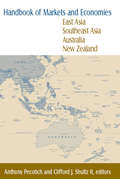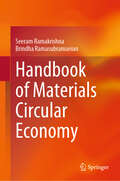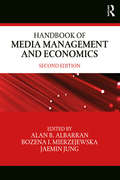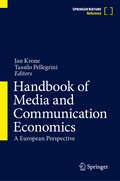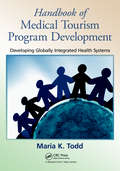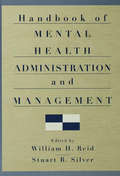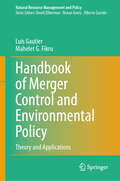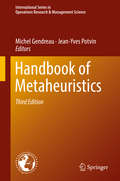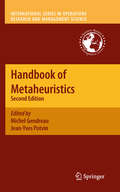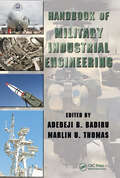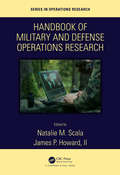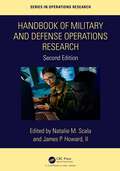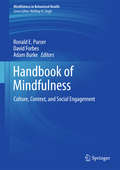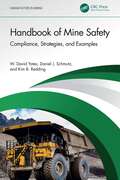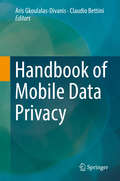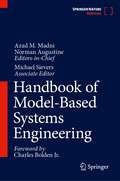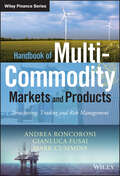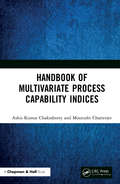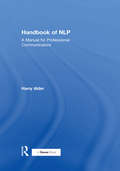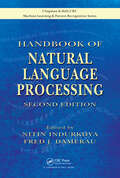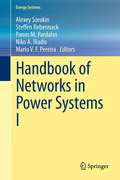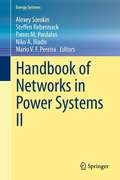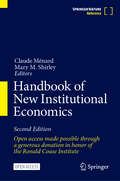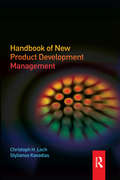- Table View
- List View
Handbook of Markets and Economies: East Asia, Southeast Asia, Australia, New Zealand
by Anthony Pecotich Clifford J ShultzEast and Southeast Asia is a vast and complex region. Its countries have a bewildering array of histories, demographics, economic structures, cultural backgrounds, and global marketing potential. This Handbook unravels the mystery. Each chapter is written by a country specialist and provides a thorough and up-to-date analysis of one of the ESEA countries. Each author follows a consistent model and covers geography and natural resources, the political system, the economic system, the social system, and the marketing environment. Complete chapters are devoted to: Australia, Brunei, Cambodia, China and Hong Kong, East Timor, Indonesia, Japan, Korea (North and South), Laos, Malaysia, Myanmar, New Zealand, Papua New Guinea, the Philippines, Singapore, Taiwan, Thailand, and Vietnam. Not just a review of current conditions, the Handbook offers prognoses for future marketing and commercial activity in each country. This definitive resource is generously illustrated with maps, figures, and tables, and includes comprehensive references and source materials for each country. It is an essential reference for students, researchers, and practitioners in the global economy.
Handbook of Materials Circular Economy
by Seeram Ramakrishna Brindha RamasubramanianThis book provides comprehensive and practical information on the design and implementation of circular systems for various industries, with a focus on Environmental, Social, and Governance (ESG) factors. The scope of the handbook is to cover the materials circularity in a deeper analysis in accordance to ESG used in various industries such as oil and gas, IT, electronics, medicine, textile, and more. The handbook also covers the key principles of the circular economy, including material efficiency, resource conservation, and waste reduction, and how they impact to different industries. It further critically analyses the challenges and opportunities associated with implementing circular systems in these industries, including the framework for new business models and technical innovations, and the potential benefits in terms of environmental protection, social responsibility, and economic competitiveness. In addition to providing practical information, the handbookalso addresses the ESG factors associated with the circular economy exclusively for each industry. This would include the impact of circular systems on the environment, including the reduction of greenhouse gas emissions and the protection of biodiversity, as well as the social benefits, such as job creation, and the economic benefits, such as cost savings and increased competitiveness. The ultimate goal of the handbook should be to provide guidance and support in a niche evaluation for the development of a more sustainable and equitable future, where the circular economy is a key enabler.
Handbook of Media Management and Economics (Media Management and Economics Series)
by Alan Albarran Bozena Mierzejewska Jaemin JungThe Handbook of Media Management and Economics has become a required reference for students, professors, policy makers and industry practitioners. The volume was developed around two primary objectives: assessing the state of knowledge for the key topics in the media management and economics fields; and establishing the research agenda in these areas, ultimately pushing the field in new directions. The Handbook's chapters are organized into parts addressing the theoretical components, key issues, analytical tools, and future directions for research. With its unparalleled breadth of content from expert authors, the Handbook provides background knowledge of the various theoretical dimensions and historical paradigms, and establishes the direction for the next phases of research in this evolving arena of study. Updates include the rise of mobile and social media, globalization, audience fragmentation and big data.
Handbook of Media and Communication Economics: A European Perspective
by Jan Krone Tassilo PellegriniThis handbook maps the media economy in its entirety against the background of the advancing digitalization of communication, media production, media distribution and the adaptation of regulatory framework conditions from different disciplinary approaches. It provides an integrated view on digitally induced economic transformations of the European media sector, and gives an explicitly European perspective on media economics – challenging the dominant US-American view.Topics covered include, but are not limited to: Theoretical approaches to media economics; media technologies and data management in media economics; building blocks of the media industry; media types and core distribution markets; system aspects and communication culture; media systems and regulatory policy; as well as methods of media economics.The handbook is a must-read for students, teachers and researchers in media and communication economics and science,as well as practicioners and policy-makers at the nexus of media, business and politics.
Handbook of Medical Tourism Program Development: Developing Globally Integrated Health Systems
by Maria K. ToddExplaining how to develop a patient-centered medical tourism program, the Handbook of Medical Tourism Development is the ideal guide for any hospital, clinic, hotel, spa, or ancillary facility wishing to become a medical tourism provider. From high-cost surgery, transplants, diagnostics, and preventive wellness checkups, to medical and wellness spa
Handbook of Mental Health Administration and Management
by Mph William H. Reid Stuart B. SilverClinicians who understand mental health care administration in addition to their clinical fields are likely to be valuable to the organizations in which they work. This handbook is an accessible source of information for professionals coming from either clinical or management backgrounds. Sections offer coverage in: mental health administrative principles, mental health care management, business, finance and funding of care, information technology, human resources and legal issues.
Handbook of Merger Control and Environmental Policy: Theory and Applications (Natural Resource Management and Policy #59)
by Luis Gautier Mahelet G. FikruThis book presents an integrated theory of firms’ strategies and two types of policies, namely environmental policies, and merger control policies. It develops a framework to examine the intricate relationship between merger and acquisition (M&A) incentives, merger control policy, environmental policies, and firms’ sustainability practices. The chapters highlight the importance of policy coordination to underscore the link between M&A and environmental externality, and the link between merger policy and environmental policy. Drawing together related fields that are seldom linked in the literature, this volume offers a comprehensive and authoritative reference for scholars, graduate students, and policymakers.
Handbook of Metaheuristics (International Series In Operations Research And Management Science #146)
by Michel Gendreau Jean-Yves PotvinThe third edition of this handbook is designed to provide a broad coverage of the concepts, implementations, and applications in metaheuristics. The book’s chapters serve as stand-alone presentations giving both the necessary underpinnings as well as practical guides for implementation. The nature of metaheuristics invites an analyst to modify basic methods in response to problem characteristics, past experiences, and personal preferences, and the chapters in this handbook are designed to facilitate this process as well. This new edition has been fully revised and features new chapters on swarm intelligence and automated design of metaheuristics from flexible algorithm frameworks. The authors who have contributed to this volume represent leading figures from the metaheuristic community and are responsible for pioneering contributions to the fields they write about. Their collective work has significantly enriched the field of optimization in general and combinatorial optimization in particular.Metaheuristics are solution methods that orchestrate an interaction between local improvement procedures and higher level strategies to create a process capable of escaping from local optima and performing a robust search of a solution space. In addition, many new and exciting developments and extensions have been observed in the last few years. Hybrids of metaheuristics with other optimization techniques, like branch-and-bound, mathematical programming or constraint programming are also increasingly popular. On the front of applications, metaheuristics are now used to find high-quality solutions to an ever-growing number of complex, ill-defined real-world problems, in particular combinatorial ones. This handbook should continue to be a great reference for researchers, graduate students, as well as practitioners interested in metaheuristics.
Handbook of Metaheuristics (International Series in Operations Research & Management Science #146)
by Michel Gendreau and Jean-Yves PotvinThe rst edition of the Handbook of Metaheuristics was published in 2003 under the editorship of Fred Glover and Gary A. Kochenberger. Given the numerous - velopments observed in the eld of metaheuristics in recent years, it appeared that the time was ripe for a second edition of the Handbook. For different reasons, Fred and Gary were unable to accept Springer’s invitation to prepare this second e- tion and they suggested that we should take over the editorship responsibility of the Handbook. We are deeply honored and grateful for their trust. As stated in the rst edition, metaheuristics are “solution methods that orch- trate an interaction between local improvement procedures and higher level stra- gies to create a process capable of escaping from local optima and performing a robust search of a solution space. ” Although this broad characterization still holds today, many new and exciting developments and extensions have been observed in the last few years. We think in particular to hybrids, which take advantage of the strengths of each of their individual metaheuristic components to better explore the solution space. Hybrids of metaheuristics with other optimization techniques, like branch-and-bound, mathematical programming or constraint programming are also increasingly popular. On the front of applications, metaheuristics are now used to nd high-quality solutions to an ever-growing number of complex, ill-de ned re- world problems, in particular combinatorial ones.
Handbook of Military Industrial Engineering (Systems Innovation Book Series)
by Adedeji B. Badiru Marlin U. ThomasIn light of increasing economic and international threats, military operations must be examined with a critical eye in terms of process design, management, improvement, and control. Although the Pentagon and militaries around the world have utilized industrial engineering (IE) concepts to achieve this goal for decades, there has been no single reso
Handbook of Military and Defense Operations Research (Chapman & Hall/CRC Series in Operations Research)
by Ii James P. Howard Natalie M. ScalaOperations research (OR) is a core discipline in military and defense management. Coming to the forefront initially during World War II, OR provided critical contributions to logistics, supply chains, and strategic simulation, while enabling superior decision-making for Allied forces. OR has grown to include analytics and many applications, including artificial intelligence, cybersecurity, and big data, and is the cornerstone of management science in manufacturing, marketing, telecommunications, and many other fields. The Handbook of Military and Defense Operations Research presents the voices leading OR and analytics to new heights in security through research, practical applications, case studies, and lessons learned in the field. Features Applies the experiences of educators and practitioners working in the field Employs the latest technology developments in case studies and applications Identifies best practices unique to the military, security, and national defense problem space Highlights similarities and dichotomies between analyses and trends that are unique to military, security, and defense problems
Handbook of Military and Defense Operations Research (Chapman & Hall/CRC Series in Operations Research)
by James P. Howard Natalie M. ScalaTracing its roots back to World War II, operations research (OR) has become a vital tool in military and defense strategy. The second edition of the Handbook of Military and Defense Operations Research highlights this evolution, showcasing how OR integrates with cutting-edge areas like artificial intelligence, cybersecurity, and big data analytics.This volume is more than a historical account; it is a practical guide. The volume features expert voices and offers insights into OR applications in modern security challenges. Readers will discover a blend of theory and real-world case studies, making it an essential resource for both newcomers and seasoned defense analysis professionals.Dive into this handbook to explore the rich, dynamic field of military and defense operations research, a discipline at the heart of global security and strategic decision-making.New to the second edition: Reorganized into a three-part structure Extensive revisions throughout Numerous new exercises, examples, and case studies Several new chapters
Handbook of Mindfulness: Culture, Context, and Social Engagement (Mindfulness in Behavioral Health)
by David Forbes Adam Burke Ronald E. PurserThis handbook explores mindfulness philosophy and practice as it functions in today’s socioeconomic, cultural, and political landscape. Chapters discuss the many ways in which classic concepts and practices of mindfulness clash, converge, and influence modern theories and methods, and vice versa. Experts across many disciplines address the secularization and commercialization of Buddhist concepts, the medicalizing of mindfulness in therapies, and progressive uses of mindfulness in education. The book addresses the rise of the, “mindfulness movement”, and the core concerns behind the critiques of the growing popularity of mindfulness. It covers a range of dichotomies, such as traditional versus modern, religious versus secular, and commodification versus critical thought and probes beyond the East/West binary to larger questions of economics, philosophy, ethics, and, ultimately, meaning.Featured topics include:A compilation of Buddhist meditative practices.Selling mindfulness and the marketing of mindful products.A meta-critique of mindfulness critiques - from McMindfulness to critical mindfulnessMindfulness-based interventions in clinical psychology and neuroscience.Corporate mindfulness and usage in the workplace.Community-engaged mindfulness and its role in social justice.The Handbook of Mindfulness is a must-have resource for clinical psychologists, complementary and alternative medicine professionals/practitioners, neuroscientists, and educational and business/management leaders and policymakers as well as related mental health, medical, and educational professionals/practitioners.
Handbook of Mine Safety: Compliance, Strategies, and Examples (Human Factors in Mining)
by W. David Yates Daniel J. Schmutz Kim B. ReddingThe field of mining safety is rapidly evolving and staying abreast of regulations and standards is crucial for any mining professional. However, with a growing scarcity of seasoned professionals, the industry faces a pressing need for comprehensive resources.Addressing this gap, the Handbook of Mine Safety: Compliance, Strategies, and Examples provides essential guidance for practitioners. From navigating complex hazards to interpreting evolving standards, this handbook offers indispensable insights tailored to the unique challenges of the mining sector. Inside the book, readers will find a wealth of practical information aimed at enhancing safety protocols and compliance. Beyond theoretical discussion, this handbook offers practical and actionable strategies and real-world examples to aid in the implementation of safety measures. From legal requirements to corrective measures, each chapter is written by an expert in the field and has been crafted to equip professionals with the tools they need to navigate the complexities of mining safety effectively. This will be the only guide the professional will need to gain a full understanding of all facets of safety in the mining industry.This handbook is a must-have resource for professionals in the fields of Occupational Health and Safety, Mining Engineering, Safety Engineering and Fire Safety. Whether you're a seasoned practitioner seeking to deepen your understanding or a newcomer looking to establish a solid foundation in mining safety, this book offers invaluable theory and practical guidance to enhance safety practices and mitigate risks in the dynamic world of mining operations.
Handbook of Mobile Data Privacy
by Aris Gkoulalas-Divanis Claudio BettiniThis handbook covers the fundamental principles and theory, and the state-of-the-art research, systems and applications, in the area of mobility data privacy. It is primarily addressed to computer science and statistics researchers and educators, who are interested in topics related to mobility privacy. This handbook will also be valuable to industry developers, as it explains the state-of-the-art algorithms for offering privacy. By discussing a wide range of privacy techniques, providing in-depth coverage of the most important ones, and highlighting promising avenues for future research, this handbook also aims at attracting computer science and statistics students to this interesting field of research. The advances in mobile devices and positioning technologies, together with the progress in spatiotemporal database research, have made possible the tracking of mobile devices (and their human companions) at very high accuracy, while supporting the efficient storage of mobility data in data warehouses, which this handbook illustrates. This has provided the means to collect, store and process mobility data of an unprecedented quantity, quality and timeliness. As ubiquitous computing pervades our society, user mobility data represents a very useful but also extremely sensitive source of information. On one hand, the movement traces that are left behind by the mobile devices of the users can be very useful in a wide spectrum of applications such as urban planning, traffic engineering, and environmental pollution management. On the other hand, the disclosure of mobility data to third parties may severely jeopardize the privacy of the users whose movement is recorded, leading to abuse scenarios such as user tailing and profiling. A significant amount of research work has been conducted in the last 15 years in the area of mobility data privacy and important research directions, such as privacy-preserving mobility data management, privacy in location sensing technologies and location-based services, privacy in vehicular communication networks, privacy in location-based social networks, privacy in participatory sensing systems which this handbook addresses.. This handbook also identifies important privacy gaps in the use of mobility data and has resulted to the adoption of international laws for location privacy protection (e.g., in EU, US, Canada, Australia, New Zealand, Japan, Singapore), as well as to a large number of interesting technologies for privacy-protecting mobility data, some of which have been made available through open-source systems and featured in real-world applications.
Handbook of Model-Based Systems Engineering
by Azad M. Madni Michael Sievers Norman AugustineThis handbook brings together diverse domains and technical competences of Model Based Systems Engineering (MBSE) into a single, comprehensive publication. It is intended for researchers, practitioners, and students/educators who require a wide-ranging and authoritative reference on MBSE with a multidisciplinary, global perspective. It is also meant for those who want to develop a sound understanding of the practice of systems engineering and MBSE, and/or who wish to teach both introductory and advanced graduate courses in systems engineering. It is specifically focused on individuals who want to understand what MBSE is, the deficiencies in current practice that MBSE overcomes, where and how it has been successfully applied, its benefits and payoffs, and how it is being deployed in different industries and across multiple applications. MBSE engineering practitioners and educators with expertise in different domains have contributed chapters that address various uses of MBSE and related technologies such as simulation and digital twin in the systems lifecycle. The introductory chapter reviews the current state of practice, discusses the genesis of MBSE and makes the business case. Subsequent chapters present the role of ontologies and meta-models in capturing system interdependencies, reasoning about system behavior with design and operational constraints; the use of formal modeling in system (model) verification and validation; ontology-enabled integration of systems and system-of-systems; digital twin-enabled model-based testing; system model design synthesis; model-based tradespace exploration; design for reuse; human-system integration; and role of simulation and Internet-of-Things (IoT) within MBSE.
Handbook of Multi-Commodity Markets and Products
by Gianluca Fusai Andrea Roncoroni Mark CumminsThe comprehensive guide to working more effectively within the multi-commodity market. The Handbook of Multi-Commodity Markets and Products is the definitive desktop reference for traders, structurers, and risk managers who wish to broaden their knowledge base. This non-technical yet sophisticated manual covers everything the professional needs to become acquainted with the structure, function, rules, and practices across a wide spectrum of commodity markets. Contributions from a global team of renowned industry experts provide real-world examples for each market, along with tools for analyzing, pricing, and risk managing deals. The discussion focuses on convergence, including arbitrage valuation, econometric modeling, market structure analysis, contract engineering, and risk, while simulated scenarios help readers understand the practical application of the methods and models presented. Gradual deregulation and the resulting increase in diversity and activity have driven the evolution of the traditionally segmented market toward integration, raising important questions about opportunity identification and analysis in multi-commodity deals. This book helps professionals navigate the shift, providing in-depth information and practical advice. Structure and manage both simple and sophisticated multi-commodity deals Exploit pay-off profiles and trading strategies with a diversified set of commodity prices Develop more accurate forecasting models by considering additional metrics Price energy products and other commodities in segmented markets with an eye toward specific structural features As one of the only markets strong enough to boom during the credit crunch, the commodities markets are growing rapidly. Combined with increasing convergence, this transition presents potentially valuable opportunities for the development of a robust multi-commodity portfolio. For the professional seeking deeper understanding and a more effective strategy, the Handbook of Multi-Commodity Markets and Products offers complete information and expert guidance.
Handbook of Multivariate Process Capability Indices
by Ashis Kumar Chakraborty Moutushi ChatterjeeProviding a single-valued assessment of the performance of a process is often one of the greatest challenges for a quality professional. Process Capability Indices (PCIs) precisely do this job. For processes having a single measurable quality characteristic, there is an ample number of PCIs, defined in literature. The situation worsens for multivariate processes, i.e., where there is more than one correlated quality characteristic. Since in most situations quality professionals face multiple quality characteristics to be controlled through a process, Multivariate Process Capability Indices (MPCIs) become the order of the day. However, there is no book which addresses and explains different MPCIs and their properties. The literature of Multivariate Process Capability Indices (MPCIs) is not well organized, in the sense that a thorough and systematic discussion on the various MPCIs is hardly available in the literature. Handbook of Multivariate Process Capability Indices provides an extensive study of the MPCIs defined for various types of specification regions. This book is intended to help quality professionals to understand which MPCI should be used and in what situation. For researchers in this field, the book provides a thorough discussion about each of the MPCIs developed to date, along with their statistical and analytical properties. Also, real life examples are provided for almost all the MPCIs discussed in the book. This helps both the researchers and the quality professionals alike to have a better understanding of the MPCIs, which otherwise become difficult to understand, since there is more than one quality characteristic to be controlled at a time. Features: A complete guide for quality professionals on the usage of different MPCIs. A step by step discussion on multivariate process capability analysis, starting from a brief discussion on univariate indices. A single source for all kinds of MPCIs developed so far. Comprehensive analysis of the MPCIs, including analysis of real-life data. References provided at the end of each chapter encompass the entire literature available on the respective topic. Interpretation of the MPCIs and development of threshold values of many MPCIs are also included. This reference book is aimed at the post graduate students in Industrial Statistics. It will also serve researchers working in the field of Industrial Statistics, as well as practitioners requiring thorough guidance regarding selection of an appropriate MPCI suitable for the problem at hand.
Handbook of NLP: A Manual for Professional Communicators
by Harry AlderSince its Californian beginnings a generation ago, Neurolinguistic Programming (NLP) has won world-wide recognition as probably the most powerful set of tools available for improving communication, thinking and problem-solving. Derived from the study of leading practitioners in fields as disparate as psychotherapy and selling, NLP is now used extensively in business, management, human resource development and sport. Dr Alder's Handbook brings together in one volume the ideas and skills involved in applying NLP to achieve superior performance at both the personal and the professional level. Part 1 sets out the underlying principles and introduces key concepts such as outcomes, representational systems, anchoring, modelling and reframing, together with the techniques required for putting them to work. Part 2 shows how to use NLP in training, selling, negotiating, interviewing, coaching and presentation. Throughout the text there are examples and exercises designed to help readers profit from, rather than simply understand, the procedures described. Other valuable features include a glossary of terms and a sources and resources section containing an annotated reading list and details of organizations offering NLP training. Anyone seeking a comprehensive guide to NLP theory and practice need look no further.
Handbook of Natural Language Processing (Chapman & Hall/CRC Machine Learning & Pattern Recognition)
by Nitin Indurkhya Fred J. DamerauThe Handbook of Natural Language Processing, Second Edition presents practical tools and techniques for implementing natural language processing in computer systems. Along with removing outdated material, this edition updates every chapter and expands the content to include emerging areas, such as sentiment analysis.New to the Second EditionGreater
Handbook of Networks in Power Systems I (Energy Systems)
by Panos M. Pardalos Alexey Sorokin Niko A. Iliadis Steffen Rebennack Mario V. F. PereiraEnergy has been an inevitable component of human lives for decades. Recent rapid developments in the area require analyzing energy systems not as independent components but rather as connected interdependent networks. The Handbook of Networks in Power Systems includes the state-of-the-art developments that occurred in the power systems networks, in particular gas, electricity, liquid fuels, freight networks, as well as their interactions. The book is separated into two volumes with three sections, where one scientific paper or more are included to cover most important areas of networks in power systems. The first volume covers topics arising in electricity network, in particular electricity markets, smart grid, network expansion, as well as risk management. The second volume presents problems arising in gas networks; such as scheduling and planning of natural gas systems, pricing, as well as optimal location of gas supply units. In addition, the second volume covers the topics of interactions between energy networks. Each subject is identified following the activity on the domain and the recognition of each subject as an area of research. The scientific papers are authored by world specialists on the domain and present either state-of-the-arts reviews or scientific developments.
Handbook of Networks in Power Systems II
by Panos M. Pardalos Alexey Sorokin Niko A. Iliadis Mario V. Pereira Steffen RebennackEnergy has been an inevitable component of human lives for decades. Recent rapid developments in the area require analyzing energy systems not as independent components but rather as connected interdependent networks. The Handbook of Networks in Power Systems includes the state-of-the-art developments that occurred in the power systems networks, in particular gas, electricity, liquid fuels, freight networks, as well as their interactions. The book is separated into two volumes with three sections, where one scientific paper or more are included to cover most important areas of networks in power systems. The first volume covers topics arising in electricity network, in particular electricity markets, smart grid, network expansion, as well as risk management. The second volume presents problems arising in gas networks; such as scheduling and planning of natural gas systems, pricing, as well as optimal location of gas supply units. In addition, the second volume covers the topics of interactions between energy networks. Each subject is identified following the activity on the domain and the recognition of each subject as an area of research. The scientific papers are authored by world specialists on the domain and present either state-of-the-arts reviews or scientific developments.
Handbook of Networks in Power Systems II (Energy Systems)
by Panos M. Pardalos Alexey Sorokin Niko A. Iliadis Steffen Rebennack Mario V. F. PereiraEnergy has been an inevitable component of human lives for decades. Recent rapid developments in the area require analyzing energy systems not as independent components but rather as connected interdependent networks. The Handbook of Networks in Power Systems includes the state-of-the-art developments that occurred in the power systems networks, in particular gas, electricity, liquid fuels, freight networks, as well as their interactions. The book is separated into two volumes with three sections, where one scientific paper or more are included to cover most important areas of networks in power systems. The first volume covers topics arising in electricity network, in particular electricity markets, smart grid, network expansion, as well as risk management. The second volume presents problems arising in gas networks; such as scheduling and planning of natural gas systems, pricing, as well as optimal location of gas supply units. In addition, the second volume covers the topics of interactions between energy networks. Each subject is identified following the activity on the domain and the recognition of each subject as an area of research. The scientific papers are authored by world specialists on the domain and present either state-of-the-arts reviews or scientific developments.
Handbook of New Institutional Economics
by Claude Ménard Mary M. ShirleyThis Open Access Handbook of New Institutional Economics (NIE) is a comprehensive reference work providing a unique and timely overview of recent developments and broad orientations in institutional analysis. This second edition has been thoroughly updated and extended, including 23 new chapters on political and legal institutions, organizations and contracts, regulation, culture, methodology and institutional change. Chapters have been written by highly respected scientists in the field, among them Ronald Coase, Douglass North, Elinor Ostrom, Oliver Williamson and Roger Myerson, all Nobel recipients, as well as by numerous other foremost NIE specialists at the frontier of NIE research. This Handbook gives students and young researchers an introduction to the topic and offers all scholars a reference book for their research. It will also be of interest to economists, political scientists, legal scholars, management specialists, sociologists, and others wishing to learn more about these important subjects and gain insight into progress made by institutionalists from other disciplines. Open access made possible through a generous donation in honor of the Ronald Coase Institute.
Handbook of New Product Development Management
by Christoph H. LochManaging new product development is a key area of management, straddling strategy, innovation and entrepreneurship and macro-organizational behaviour.All of the contributorsin the Handbook of New Product Developmentare are well-known and leading exponents to theory of New Product Development and to methods used in practice. They draw upon their experience and work to offer a comprehensive view of the challenges in managing the development of new products. Existing knowledge in the different topics is examined and the key management challenges, and the important gaps in our knowledge are discussed. Most of the chapters draw upon systematic interaction with companies and practice and this is presented in the examples and the case studies cited. The Handbook of New Product Development and Management surveys this area in the context of an overall framework that explains how aspects interact and combine in a successful NPD process. Each chapter outlines open questions and highlights needs for future research.
